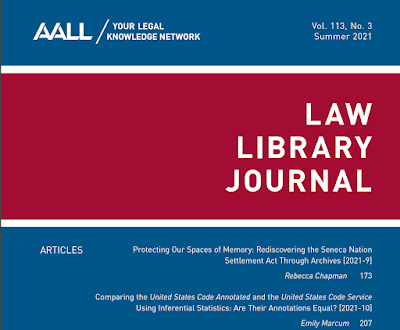The Summer 2021 issue of Law Library Journal, a publication of the American Association of Law Libraries, is available online.
One of the feature articles in this issue is "Comparing the United States Code Annotated and the United States Code Service Using Inferential Statistics: Are Their Annotations Equal?".
Both are heavily annotated versions of the US Code, the massive consolidation of valid federal legislation in the United States.
The annotated codes contain the text of U.S. federal laws, plus amendment history, related case law and references to other research materials such as encyclopedias, journal articles etc.
"There are two choices for annotated versions of the United States Code in print.
The version published by West Publishing is the United States Code Annotated, or
U.S.C.A., and the version published by Lexis Publishing is the United States Code
Service, or U.S.C.S. Many law libraries, especially academic ones, carry copies of each,
historically because they are thought to have different annotations. But which set
should the researcher choose? Should the researcher use both? Should libraries continue to subscribe to both? (from the introduction)"
"(...) we can say that the case annotations given are significantly different
from each other. Put differently, there is a significant amount of non-overlap between
the case annotations offered by one set and those offered by the other."
"Law libraries often buy both sets of annotated codes because law librarians have
historically thought the two sets different. This study confirms that. However, it is still
surprising that the percentages of unique annotations were so high: 76 percent of annotations being unique to the U.S.C.A. and 70.5 percent being unique to the U.S.C.S. is much higher than I expected it to be. Given such a high percentage of diversity between the two, a researcher may be well served by examining both sets when starting research. Libraries should continue to buy both sets despite the cost burden, if possible. (from the conclusion)"
This lack of overlap between research platforms should not surprise law librarians.
My experience is that many researchers become used to searching in one or maybe two online tools when looking for commentary or caselaw, forgetting that no platform provides anything close to comprehensive coverage. And results can be quite different depending on which database one is searching.
Labels: databases, journals, legislation, library associations, search






